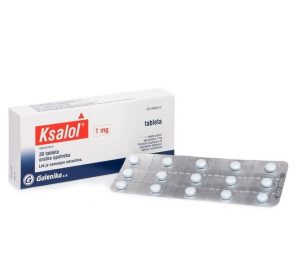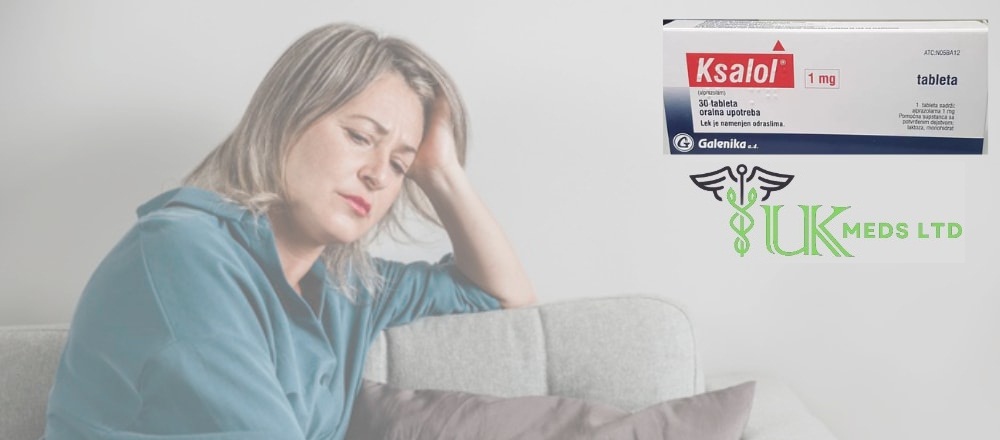Introduction: Ksalol 1 Mg
Ksalol 1 mg contains alprazolam as its active ingredient and is commonly prescribed for the management of anxiety disorders, panic disorders, and symptoms associated with anxiety. Its effectiveness stems from its classification as a benzodiazepine, a group of medications that enhance the effects of a neurotransmitter called gamma-aminobutyric acid (GABA) in the brain. By increasing GABA activity, Ksalol helps to produce a calming effect, making it beneficial for individuals experiencing excessive anxiety or panic attacks.
Quick relief: Ksalol 1 Mg

Patients often find that Ksalol provides quick relief from their symptoms, as it is rapidly absorbed into the bloodstream. Many report feeling a significant reduction in anxiety within a short period after taking the medication. This rapid onset of action makes Ksalol an attractive option for those who experience sudden bouts of anxiety or panic. However, it’s important to use this medication under the supervision of a healthcare professional due to potential risks and side effects.
Side effects: Ksalol 1 Mg
Common side effects associated with Ksalol 1mg include drowsiness, dizziness, and lightheadedness. These effects can be particularly pronounced when the medication is first introduced or when dosages are adjusted. Activities like driving or operating heavy machinery should be avoided until the person using it understands how the medication affects them. Additionally, individuals may experience cognitive impairments, such as difficulties with concentration or memory, especially with long-term use.
Ksalol Dependency: Ksalol 1 Mg
Ksalol’s potential for dependency is a significant concern. As a benzodiazepine, it carries a risk of physical and psychological dependence, particularly when used for extended periods or at high doses. For this reason, healthcare providers typically recommend that Ksalol be prescribed for short-term use, and patients should be monitored closely for signs of misuse. If discontinuation is necessary, a gradual tapering of the dosage is usually advised to mitigate withdrawal symptoms, which can include increased anxiety, insomnia, and, in severe cases, seizures.
Interaction with other medications: Ksalol 1 Mg
Ksalol can have additive effects when combined with alcohol, opioids, or other benzodiazepines, i.e. any other CNS depressing agents. This can lead to increased sedation and respiratory depression, which can be life-threatening. Therefore, it’s crucial for individuals to inform their healthcare providers about all medications they are currently taking, including over-the-counter drugs and herbal supplements.
Recommendations & precautions: Ksalol 1 Mg
Given its potential side effects and risks, Ksalol is typically not recommended for certain populations, such as individuals with a history of substance abuse, those with severe respiratory conditions, or pregnant and breastfeeding women. Alternatives, such as selective serotonin reuptake inhibitors (SSRIs) or cognitive-behavioral therapy (CBT), may be considered for those who are at risk or who prefer non-benzodiazepine treatment options.
Lifestyle: Ksalol 1 Mg
In addition to medication, lifestyle modifications can play a significant role in managing anxiety disorders. Regular physical activity, a balanced diet, and sufficient sleep can all contribute to improved mental health. Mindfulness practices, such as meditation and yoga, have also shown promise in reducing anxiety symptoms and enhancing overall well-being. Patients are encouraged to discuss these strategies with their healthcare providers to develop a comprehensive treatment plan that includes both medication and lifestyle changes.
Regular visits to the health care provider: Ksalol 1 Mg
Regular follow-up appointments are essential for anyone taking Ksalol. These visits provide an opportunity for healthcare providers to assess the effectiveness of the treatment, monitor for any adverse effects, and make necessary adjustments to the medication regimen. Open communication about any concerns or side effects experienced while on Ksalol can help ensure the safety and effectiveness of the treatment.
Conclusion: Ksalol 1 Mg
Ultimately, while Ksalol 1 mg can be a valuable tool in managing anxiety and panic disorders, it is essential for patients to use it responsibly and under medical guidance. By combining pharmacological treatment with lifestyle changes and ongoing support, individuals can work towards achieving better mental health and an improved quality of life.


